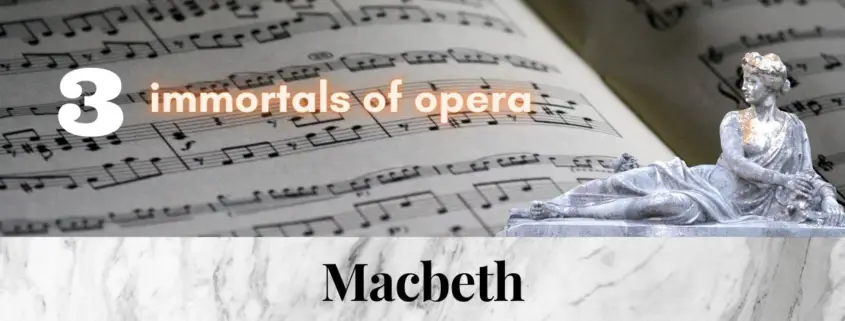If the success of an opera were based on its greatness, Macbeth would be far ahead in the favor of opera-goers. Perhaps it is the lack of a love plot (Italians call Verdi’s Macbeth “l’opera senza amore”) that stands in the way of this work’s popularity. It can’t be because of the music. The work has not a weak minute and captivates the listener from beginning to end. It is musically and artistically on a par with Verdi’s two other Shakespearean works, Otello and Falstaff.
Verdi’s conception of the role of Lady Macbeth
Verdi demanded that Lady Macbeth declaim the letter and not sing it. For the composer to have the prima donna read a letter on her first appearance instead of letting her shine with a bravura aria was unheard of at the time. Moreover, Verdi required Marianna Barbieri-Nini, the Lady Macbeth of the premiere, to make his conception of the role consistently ugly (which is documented in letters).
The year 1952 was perhaps Maria Callas’ most glamorous year vocally. In this year she finally established herself as an assoluta in the dramatic and ornamented field. On November 7, 1952, Maria Callas sang one of the most important performances of her career. Macbeth was scheduled as the season opener at La Scala. Her Lady Macbeth was sensational and the hype surrounding her degenerated into Callas mania.
Karl Böhm once called the Greek “the greatest tragedienne in the world.” The interpretation of the following aria allows the listener to experience the accuracy of his statement. No other singer had the possibilities Callas had at her disposal to draw Lady Macbeth dramatically and musically in every detail grandiose. It is to her credit that this opera has returned to the repertory.
Vieni! t’affretta accendere… Or tutti sorgete – Callas
A hometown anthem by Verdi
In the classical style, Verdi composed “Patria oppressa”, a piece that became famous as a nostalgic homeland anthem, not least for political reasons.
Patria oppressa – Abbado
The great sleepwalking scene
In the castle, Lady Macbeth is tormented by visions. In mental derangement, she tries to wipe imaginary bloodstains from her hands.
Verdi explicitly required the Lady Macbeth of the premiere to sing “ugly.” A singer originally intended for the role was explicitly rejected by Verdi because she “sang too beautifully and if the sleepwalking scene didn’t work the whole opera would be ruined.” Amazing words in a time when Donizetti was still alive and Bellini was not long dead! The aria ends with a beautiful “fil di voce,” a sound dying in the high register that carries the voice into the high des.
Critics agree that Maria Callas’ interpretation of this scene is among the greatest in the recording history of opera music. Ardoin spoke of “one of the most expressive moments of singing ever captured on record” and Kesting that “even on repeated listening there is no end to the amazement at the wealth of tonal, gestural detail.” Only one person, Verdi himself, could have dreamed it up like this”.
Una macchia è qui tuttora – Callas








Leave a Reply
Want to join the discussion?Feel free to contribute!